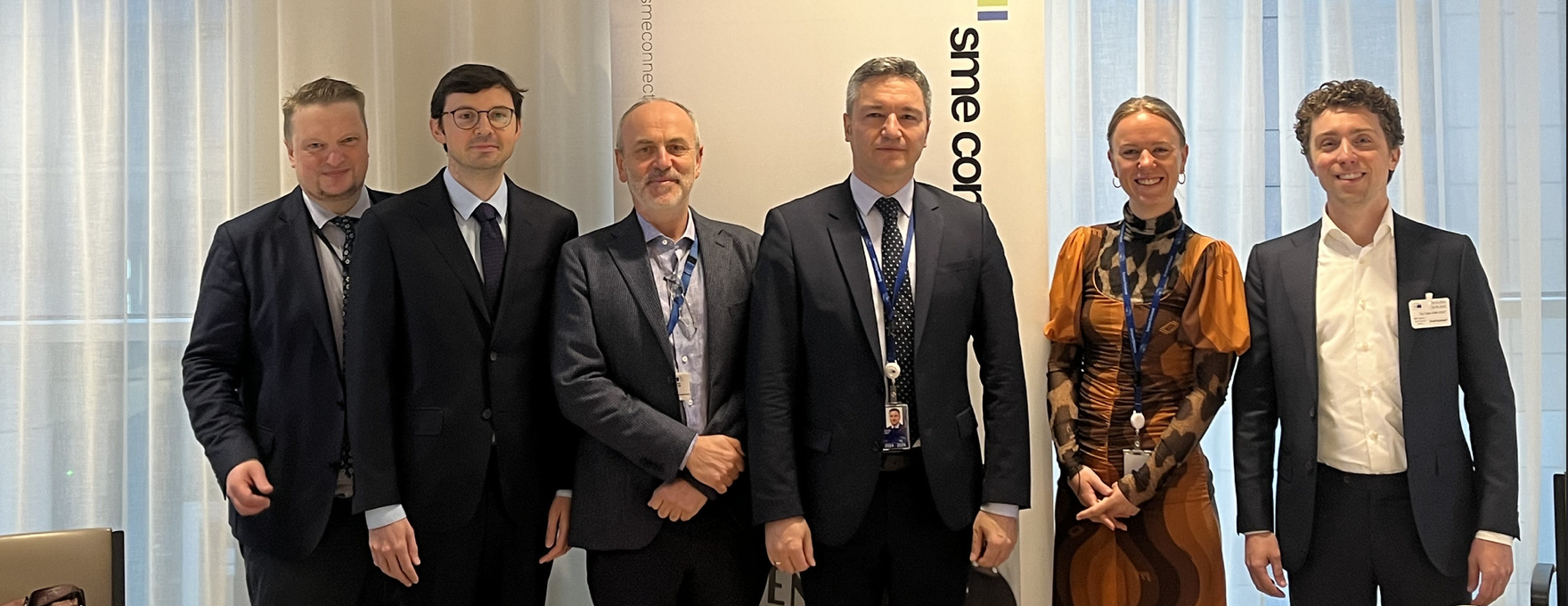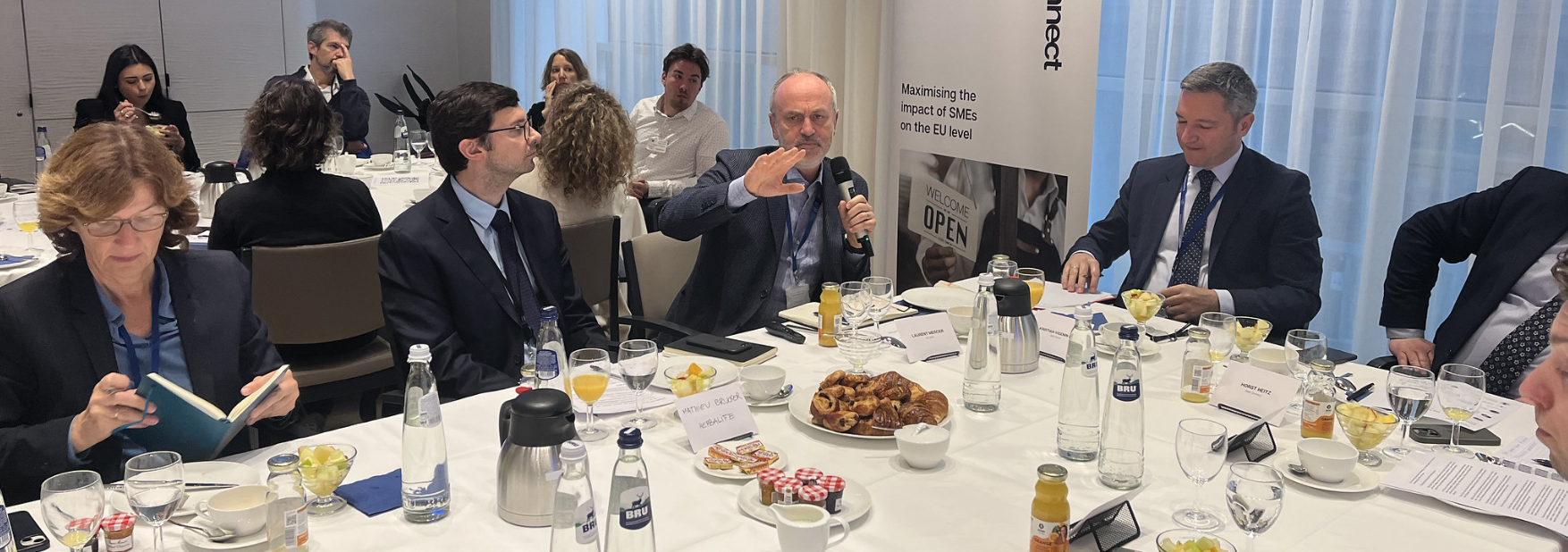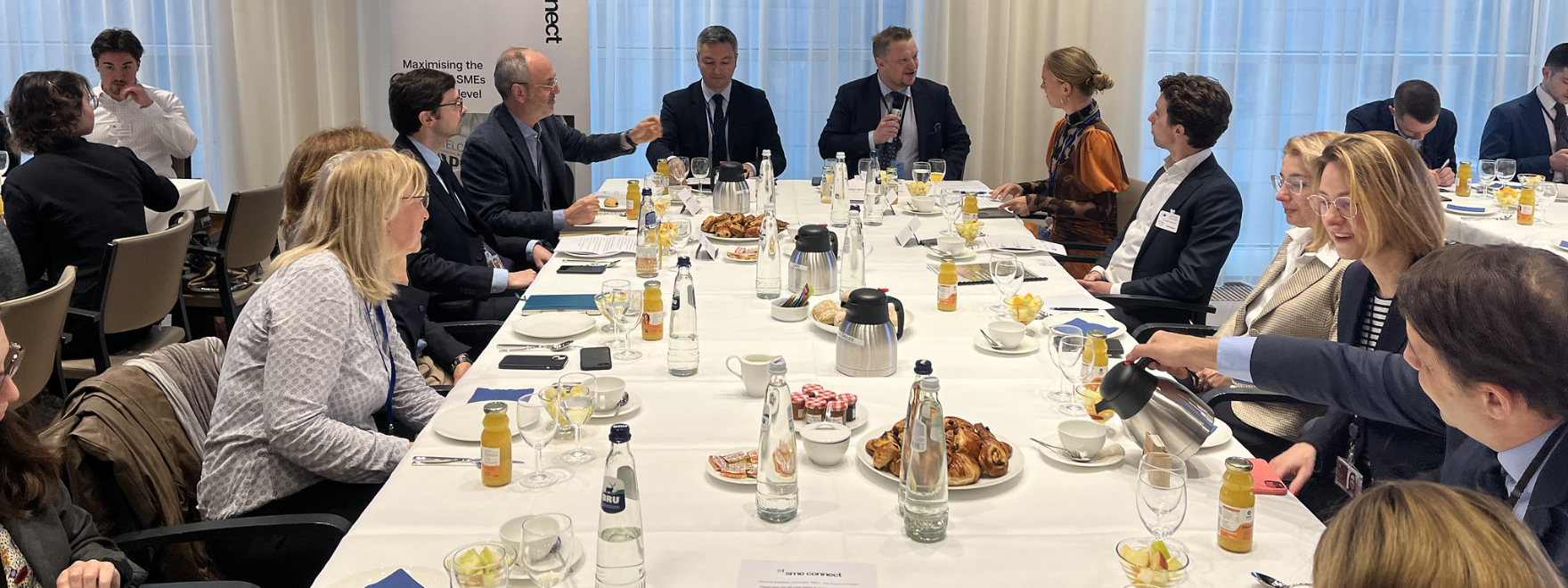Innovation Talks – The Future of Protein

On Thursday, 24 April 2025, SME Connect organised a working breakfast titled “Innovation Talks – The Future of Protein”, hosted by Kristian Vigenin, Member of the European Parliament, Committee on the Environment, Climate and Food Safety; Committee on Public Health; SME Connect Board Member; Chair of the SME Connect Working Group on Agriculture, Nutrition and Consumers (AgriNutriCom), in the European Parliament in Brussels. The panel featured distinguished experts including Emma Kirkeby, Environmental Policy Advisor to MEP Sigrid Friis; Laurent Mercier, DG AGRI, European Commission; Tijn van Vugt, Visiting Research Fellow at Institute for European Environmental Policy (IEEP); and Mathieu Brucker, Senior Manager of EU Government Affairs at Herbalife. The discussion was moderated by Horst Heitz, Chair of the Steering Committee of SME Connect.
Kristian Vigenin opened the event by highlighting the urgent need to transform Europe’s food systems through innovation, sustainability, and resilience. He stressed that plant-based proteins are no longer a future ambition but a critical part of the solution to today’s environmental and nutritional challenges. With lower emissions and resource use, they support the EU’s climate goals and align with the Green Deal and Farm to Fork Strategy.
Despite this potential, Europe still heavily relies on imports, producing only a fraction of the plant protein it consumes. In 2023–2024, just 1.1 million of 64 million tons of crude protein came from pulses, while 19 million tons were imported—creating exposure to price volatility, geopolitical risks, and environmental harm abroad. Vigenin underlined the message of the Versailles Declaration: Europe must reduce its protein deficit and build a more self-sufficient, sustainable food system.
Progress is underway. Through the Common Agricultural Policy, 20 Member States now support protein crops, and nearly all have integrated them into eco schemes. Still, a resilient system requires more than policy—it demands investment, innovation, and cooperation. Over €640 million has already been invested through Horizon programs to explore alternative proteins, from legumes to microbial fermentation and seaweed.
Vigenin emphasised the need for a supportive regulatory environment, including faster approvals for novel foods and better labeling to reflect environmental impacts. He called for an ambitious EU protein strategy that fosters diversification, strengthens infrastructure, rewards innovation, and supports circular systems. Importantly, this transition must be globally responsible, creating opportunities for producers worldwide, particularly in lower-income regions.
He concluded by framing the discussion as not just about protein, but the future of food—one where innovation, sustainability, and shared values guide EU policy. He welcomed further dialogue as the European Commission prepares to unveil its strategy.
Emma Kirkeby began by highlighting the importance of depolarising the conversation around food and protein innovation. Too often, debates around food policy become divisive and emotional, with stakeholders taking sides rather than working toward shared goals. Kirkeby emphasised that this transition is not about dictating consumer choices but about expanding them—grounding decisions in science and common sense while fostering collaboration among farmers, businesses, consumers, researchers, and policymakers.
She stressed that the shift toward plant-based proteins is not just a dietary or environmental issue but a strategic one. Livestock production currently accounts for nearly 90% of EU agricultural emissions, making plant-based protein one of the smartest solutions for meeting climate targets. Beyond environmental benefits, Kirkeby pointed out the significant health advantages of plant-forward diets, including lower risks of heart disease, obesity, and diabetes, which could reduce pressure on healthcare systems.
From an economic and food security perspective, she noted the EU’s heavy dependence on imported soy for animal feed, largely from Brazil and the U.S., which leaves Europe vulnerable to geopolitical risks. By investing in domestic plant protein production, the EU could enhance its strategic autonomy, revitalize rural areas, and create new business opportunities for farmers, SMEs, and startups already leading the way in innovative plant-based products.
Kirkeby called for more political support to unlock this potential, including better access to finance, clearer regulations, and fair competition with traditional livestock production. She advocated for a comprehensive EU action plan for plant-based foods, inspired by successful national strategies like Denmark’s. Such a plan could help farmers transition to sustainable practices, support SMEs, strengthen research, and create a level playing field for sustainable food products within the single market.
She concluded by framing the shift to plant-based proteins as a strategic investment in Europe’s future—one that can deliver environmental, health, and economic benefits while fostering a more resilient and harmonious food system.
Laurent Mercier opened his remarks by emphasising the importance of grounding the plant protein discussion in concrete data to cut through polarization and provide context for innovation. He presented key figures illustrating the current state of protein production and consumption in the EU, particularly within the livestock sector.
He highlighted that the majority of protein used for livestock feed in the EU comes from domestically produced roughage and cereals, with only a small share imported. However, despite large volumes of protein being used in feed—approximately 70 million tons—only around 11 million tons of edible protein are ultimately produced through livestock, revealing significant inefficiencies in the system.
Mercier noted that 46% of the EU’s protein production comes from roughage, followed by cereals, while just 2% comes from dry pulses, underscoring the limited role of high-protein plant crops. Two-thirds of this protein is used for animal feed, with only a third directed to food and industrial applications.
He also presented data showing that 70% of protein used by the livestock sector originates from arable crops—crops that could otherwise be used directly for human consumption. Meanwhile, 61% of dietary protein consumed globally still comes from animal sources, though this figure is higher in the Global North.
Mercier concluded by referencing ongoing political momentum behind a dedicated EU strategy on plant proteins, pointing to past commitments by the European Commission, Council declarations, and a European Parliament resolution. He encouraged participants to explore extensive resources available through the Commission’s website, including detailed data and fact sheets on protein flows, CAP measures, and innovation initiatives.

Tijn van Vugt underlined the importance of not just understanding why protein diversification is necessary in Europe, but focusing on how to implement it in a way that supports farmers and rural communities. Drawing on a recent report he authored, he highlighted that while scientific evidence strongly supports shifting away from overconsumption of animal-sourced proteins, the actual transition has been slow.
He pointed to economic modeling by the European Commission showing that a dietary shift toward more plant-based foods, without structural changes, would have limited impact on the livestock sector due to trade dynamics. This could lead to mismatches—rising exports of European meat and increasing imports of plant-based foods—causing uneven economic impacts on farmers and potentially exporting environmental benefits abroad.
Van Vugt then addressed the structural barriers preventing farmers from transitioning to more sustainable crops like legumes. These include low and unstable market demand, low yields, high costs, and the financial risks of diversification compared to more profitable livestock or major crops.
To support a fair and successful protein transition, he called for a robust European protein diversification strategy—aligned with climate goals and backed by targeted support for farmers. This should include financial risk reduction, better compensation for ecosystem services, public procurement to generate stable demand, and the creation of a European plant-based food innovation cluster to connect farming, research, and consumer needs.
Ultimately, he argued, the most powerful driver will be creating a level playing field in the EU food system to encourage an equitable dietary shift toward plant-based proteins.
Mathieu Brucker, representing Herbalife, spoke about the company’s strong commitment to health, wellness, and plant-based nutrition as a global leader in specialised nutrition products. Brucker emphasised Herbalife’s long-standing role as a pioneer in promoting plant-based diets. While soy remains their primary protein source, they have expanded their portfolio to include blends made from peas, quinoa, rice, and flax. The company collaborates with a global network of around 300 scientists and PhD researchers across 19 laboratories and actively participates in EU-funded research projects such as the Smart Protein Project, INCREASE, and Giant LEAPS.
He highlighted the environmental and health benefits of shifting towards plant-based diets, a transition Herbalife supports through extensive research and innovation. One of their key goals is to develop plant protein blends that are nutritionally equivalent to animal proteins like whey, which is considered the gold standard. Brucker noted, however, that nutritional quality alone isn’t enough—taste remains crucial for consumer acceptance.
To meet evolving consumer preferences and strengthen food security, Herbalife is working to move away from reliance on traditional crops like soy and rice, and instead aims to source more plant proteins from within the EU. Yet, he acknowledged that price remains a major barrier. To overcome this, he argued that European farmers must be supported in scaling up plant-based protein production. He expressed hope that the forthcoming EU Comprehensive Protein Strategy will include measures to accelerate this transition and assist farmers during the shift.
Brucker concluded by outlining five key pillars that should be part of a well-rounded protein diversification strategy: health, environmental sustainability, affordability, research and funding, and consumer education. He stressed that plant-based proteins support heart health and help reduce chronic disease risks, while sustainable food frameworks should ensure these diets are both accessible and affordable. Finally, he underscored the importance of consumer awareness and behavioural change, which are essential to creating lasting dietary shifts.
